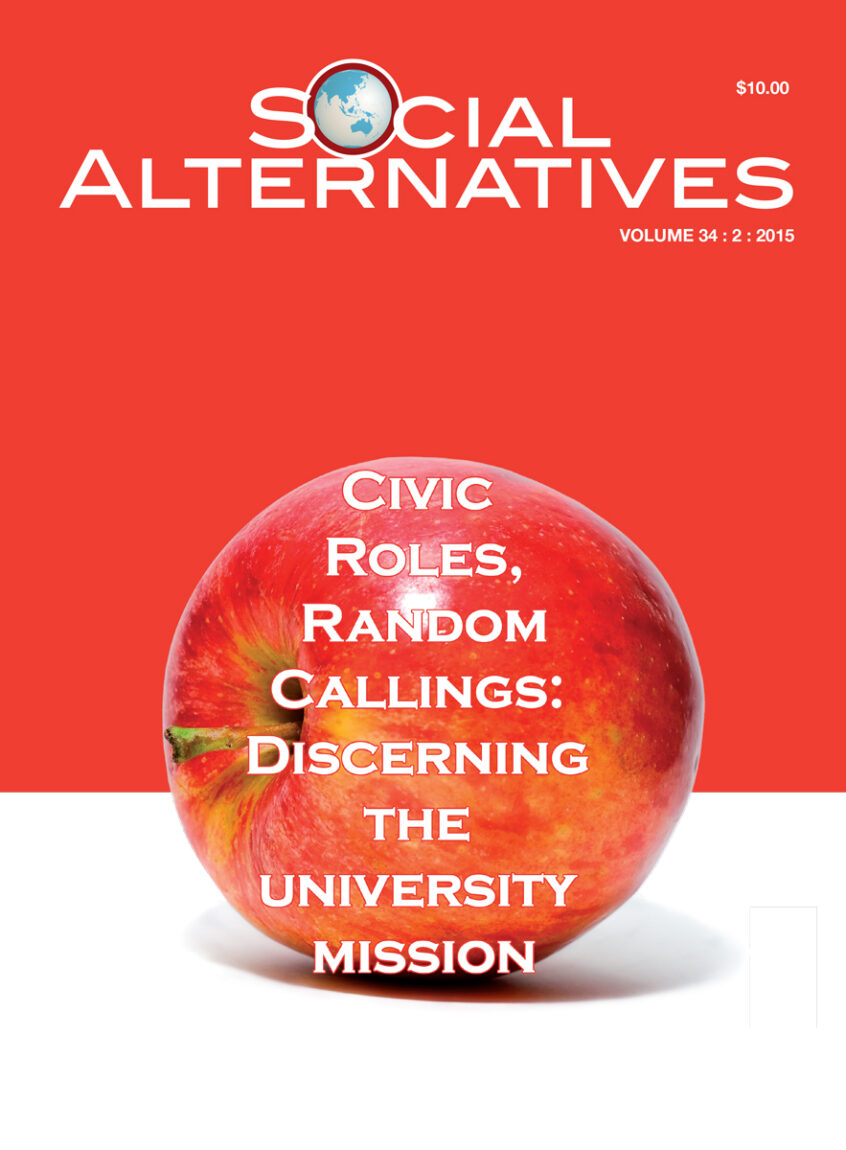Higher education nationally and internationally is immersed in cultural change and fiscal challenge which is focused on competition and a ‘tyranny of excellence’ (Butler and Spoelstra 2015; Smith, 2015: 135). These demands on universities for greater social accountability have prompted a call for new kinds of universities – institutions which operate outside the ‘ivory tower’, and which are responsive to the challenges and needs of society (Barber, Donnelly and Rizvi 2013). These ‘new’ universities have been variously described by terms such as ‘open’, (Miller and Sabapathy 2011), ‘innovative’ (Christensen and Eyring 2011) and ‘public’ (Burawoy 2011). Goddard’s (2009) concept of a ‘civic university’ also proposes that all publicly funded higher education institutions have a civic duty to engage with the wider society at local, national and international levels on issues of relevance. Goddard’s comments appear to support an era of university engagement which is tied to broader imperatives of relevance. Yet how is such relevance configured, and how does it shape the ‘third’, or entrepreneurial, mission of universities if recourse to research-led curricula or socially inspired scholarship is diminished? While inviting further deliberation, it is nevertheless clear that engagement is now core business of all universities.
| Title | Author(s) | ||
|---|---|---|---|
Articles |
|||
| Éidín O’Shea, Lisa McDonald, Vicki Crowley, Maura Adshead, Andrew Hickey, Malcolm D. Brown, Gerardine Neylon, Patricia Inman, Sukhmani Khorana, David Dowling, Samantha Rose, Éidín O'Shea, Ken Udas, Julia Miller, Kitty Te Riele, Lesley Synge, Debra Livingston, Owen Bullock, Amitabh Vikram Dwivedi, Justin Lowe, John Brinnand, David Adès, Lindy Warrell, Les Wicks, Laura Brinson, Matt Hetherington, Kit Kelen | |||
| 6 | Affective Strategies in the Academy: Creative methodologies, civicresponses and the market | Vicki Crowley and Lisa McDonald | |
| 13 | Engaged Scholarship at the University of Limerick: One response to the ‘civic shift’ in Irish higher education | Maura Adshead | |
| 20 | The Economies of Engagement: The nature of university engagement in the corporate university | Andrew Hickey | |
| 27 | Tendering for a Social Cause: Universities and social enterprise | Malcolm D. Brown | |
| 33 | Professionalising the Early Childhood Education and Care Sector: Broadening the university mission | Gerardine Neylon | |
| 39 | Regional Food Systems as Engines for Sustainable Economies: How do universities engage? | Patricia Inman | |
| 47 | Transnational Teaching and Research in Australia in the ‘Asian Century’: A narrative-based case study | Sukhmani Khorana | |
| 52 | Reconsidering Humanities Programmes in Australian Universities – Embedding a New Approach to Strengthen the Employability of Humanities Graduates by Empowering Them as ‘Global Citizens’ | David Dowling, Samantha Rose and Éidín O'Shea | |
Short Stories |
|||
| 67 | Seeking Asylum | Julia Miller | |
Book Reviews |
|||
| 68 | Living on the Edge. Rethinking poverty, class and schooling | Kitty Te Riele | |
Poetry |
|||
| 12 | Leave Me Alone | Matt Hetherington | |
| 12 | Now we are 10 | Amitabh Vikram Dwivedi | |
| 19 | Gestures | Owen Bullock | |
| 19 | Frankie & the Monuments | Les Wicks | |
| 26 | Meaning of life | Amitabh Vikram Dwivedi | |
| 32 | Nusakambangan | Justin Lowe | |
| 38 | Newspeak in Wonderland | John Brinnand | |
| 46 | The Somnambulist | David Adès | |
| 46 | Flowers Grow | Lindy Warrell | |
| 51 | Valley Man | Les Wicks | |
| 51 | Escape | Laura Brinson | |
| 62 | My Flat | Matt Hetherington | |
| 62 | To Tend | Kit Kelen | |
| 70 | Inside the Square | Robert David Verdon | |
Misc. |
|||
| 63 | Would We Be Missed? | Ken Udas | |
| 71 | Art is Nature | Debra Livingston | |

